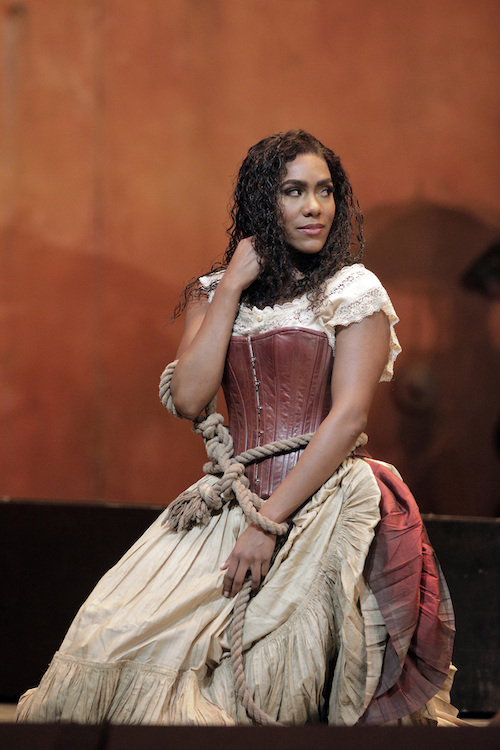Bridges’ full-blooded performance lights up Palm Beach Opera’s “Carmen”

With a parade of hit tunes and a sizzling main role, Carmen would appear to be a surefire work to open Palm Beach Opera’s 60th season.
Yet there was an unusual number of empty seats at the Kravis Center in West Palm Beach Friday evening, possibly because many people didn’t want to come for the opera and leave with the virus.
The no-shows missed a production with a lot going for it, particularly the strong performance of J’Nai Bridges in the title role. But while there were fine performances in all major parts, the production lacked the raw edge of desperation and impending doom that can make Bizet’s masterpiece such a searing experience.
Bridges brought a big, plush voice to the role. And despite her mezzo-soprano’s velvety warmth, she could sing with the pinpoint accuracy of a coloratura, snapping off fast notes with the clicking precision of castanets.
Her Carmen radiated confidence in her sexuality. In the Habanera, the famous aria on the love, she was more regal than slinky, moving with the easy authority of a woman who knows all the men are staring at her. In the Seguidilla, where she talks about dancing with her lover at Lillas Pastia’s tavern, the quick notes came off with effortless accuracy, injecting fire into this ode to love and sex.
Her acting was subtle and effective—expressing with a condescending smile her contempt for the doomed soldier Don José’s devotion to duty, as she lured him into deserting his unit and joining her band of smugglers. As she reads her dark future in the cards, the bleak tone of her rich voice told all.
Jonathan Burton portrayed Don José, the soldier who Carmen sets on a path that would end with her own death outside the bull ring. Vocally, the tenor was excellent. His Flower Song, in which he confessed to treasuring the wilting bloom she tossed to him in Seville, was real showstopper, as he effortlessly drew out long notes to wring from them maximum emotion.
He didn’t quite bring that edge of desperation to the dramatic side of a man who goes from obedient soldier to knife-wielding killer. In the final scene, where he works himself into a homicidal rage, the raw emotion seemed missing, although he still produced abundant lines of graceful melody.
For the role of the toreador Escamillo, the baritone Zachary Nelson was a late replacement for Anatoli Sivko, and he nailed the part. With his dark moustache, long sideburns and easy swagger, he embodied 19th century Spain’s equivalent of a star quarterback. His face radiated excitement as he described the carnage of the bull ring, and Nelson gave a lusty account of the Toreador Song, with a dark voice and smooth legato that convincingly drew Carmen away from the sad-sack soldier.
The performance took place on traditional, not particularly impressive sets built for Lyric Opera of Kansas City. Anyone who has seen Carmen once or twice will recognize the scenes – the weathered stucco buildings of the square in Seville, a rough tavern, the smugglers’ camp in the mountains, the doors of the bull ring. Stage director Garnett Bruce organized a performance that matched the sets in its traditionalism, although he arranged some imaginative confrontations between children, residents and soldiers that went well with Bizet’s high-spirited music.
The soprano Amanda Woodbury sang with passion and conviction as Micaëla, the sweet girl from Don José hometown who represents pretty much everything Carmen is not. One of the best moments of Friday’s performance was her moving rendition of “Je dis que rien ne m’épouvante,” as she tries to overcome her fear as she searches for Don José in the wildness of the mountains. In glowing tones, she expressed fear, courage and determination as she prayed for God to protect her.
The performance drew a typically stellar performance from the Palm Beach Opera Orchestra led by conductor Antonello Allemandi. The evening began with an assertive, immaculately played Overture, with its foretaste of some of the most famous melodies in opera. Smoky, moody music emerged from the pit as dancers took the floor in Lilla Pastia’s tavern. The Entr’acte before Act 3 produced luminous, gently swelling wind playing. There was sensitive playing in small moments throughout, such as the soft violin music at the end of the first-act duet between Don José and Micaëla.
The children’s chorus, from Young Singers of the Palm Beaches, scampered around noisily, as street urchins typically do in opera. But they delivered vocally, singing in a lively manner with pure intonation as they alternately imitated and tormented the soldiers.
The bass baritone Christopher Humbert, Jr. was a tall, imposing Lieutenant Zuniga, with powerful voice that radiated rank and authority.
As Carmen’s friend Frasquita, the soprano Avery Boettcher drew predictable laughs from her fantasy of a rich husband who dies soon, but her soaring high notes did credit to the role. As Carmen’s other friend Mercédès, mezzo-soprano Megan Callahan sang with rich, glossy tones.
Palm Beach Opera’s Carmen will be repeated 7:30 p.m. Saturday and 2 p.m. Sunday at the Kravis Center in West Palm Beach. Rihab Chaieb and Dominick Chenes will perform the principal roles on Saturday. pbopera.org.
Posted in Performances
One Response to “Bridges’ full-blooded performance lights up Palm Beach Opera’s “Carmen””
Leave a Comment
Sat Jan 29, 2022
at 12:47 pm
1 Comment
Posted Feb 03, 2022 at 12:40 am by Jon Lowell
Very good and fair review. Something was definitely lacking. Some folks left early as well during first and second intermission.